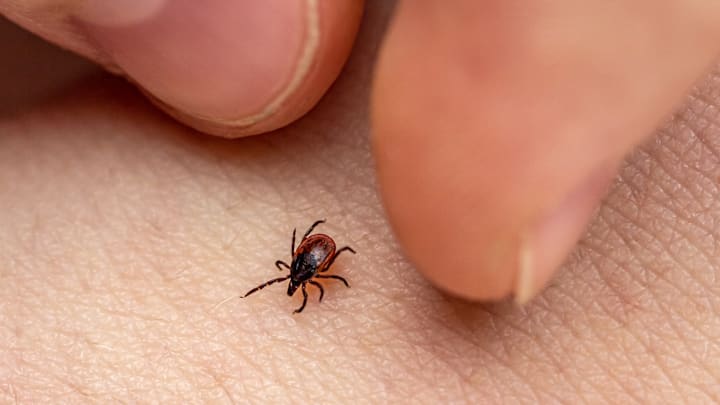Few tiny things are as feared as ticks. Some species can transmit Lyme disease, while a bite from others might make you allergic to red meat. While you may believe you need to come into direct contact with a tick to be susceptible to these ailments, it turns out that the rude little arachnid can actually cover a bit of distance to make a meal out of you. The secret? Static electricity.
In a study published in Current Biology, researchers examined the bean tick, a common European species that can carry numerous pathogens and transmit diseases to humans. When the ticks were positioned near electrodes, they were able to surf the static electricity and travel a fraction of an inch through the air, like a tick Michael Jordan flying toward the basket.
While it may not sound like a huge distance, relative to a tick’s size it’s a considerable achievement. Sam England, one of the study’s authors, told the Associated Press that “it’s the equivalent of [humans] jumping three or four flights of stairs in one go.”
Researchers already knew that ticks engage in “questing,” or hanging out on a blade of grass with their legs outstretched in the hopes of making contact with a host. The new research confirms that ticks actually have a little bit of space they can traverse, with the tiny amount of static electricity needed generated by clothing or fur. The action works vertically or horizontally, helping ticks defeat gravity in their search for a blood meal. The static also allows them to settle in without falling off too quickly.
It’s possible, the study notes, that fleas and mites also possess this ability, though it has not yet been proven.
While this novel method of transport makes ticks more likely to hitch a ride on your body, it’s a myth that they dive-bomb from trees. You’re more likely to pick up a tick loitering on the ground, though they can certainly ascend your body quickly. It’s also a myth that every tick bite comes with a “bull’s-eye” rash (that's a symptom of Lyme disease, but not every case results in the rash). If you’re outdoors where ticks have been known to lurk, it’s best to wear long pants and tuck them into your socks. Keep the colors light to better see a dark-colored hitchhiker. You can also use insect repellent sprays. Once you’re inside, check yourself for ticks and remove any you see with tweezers.
